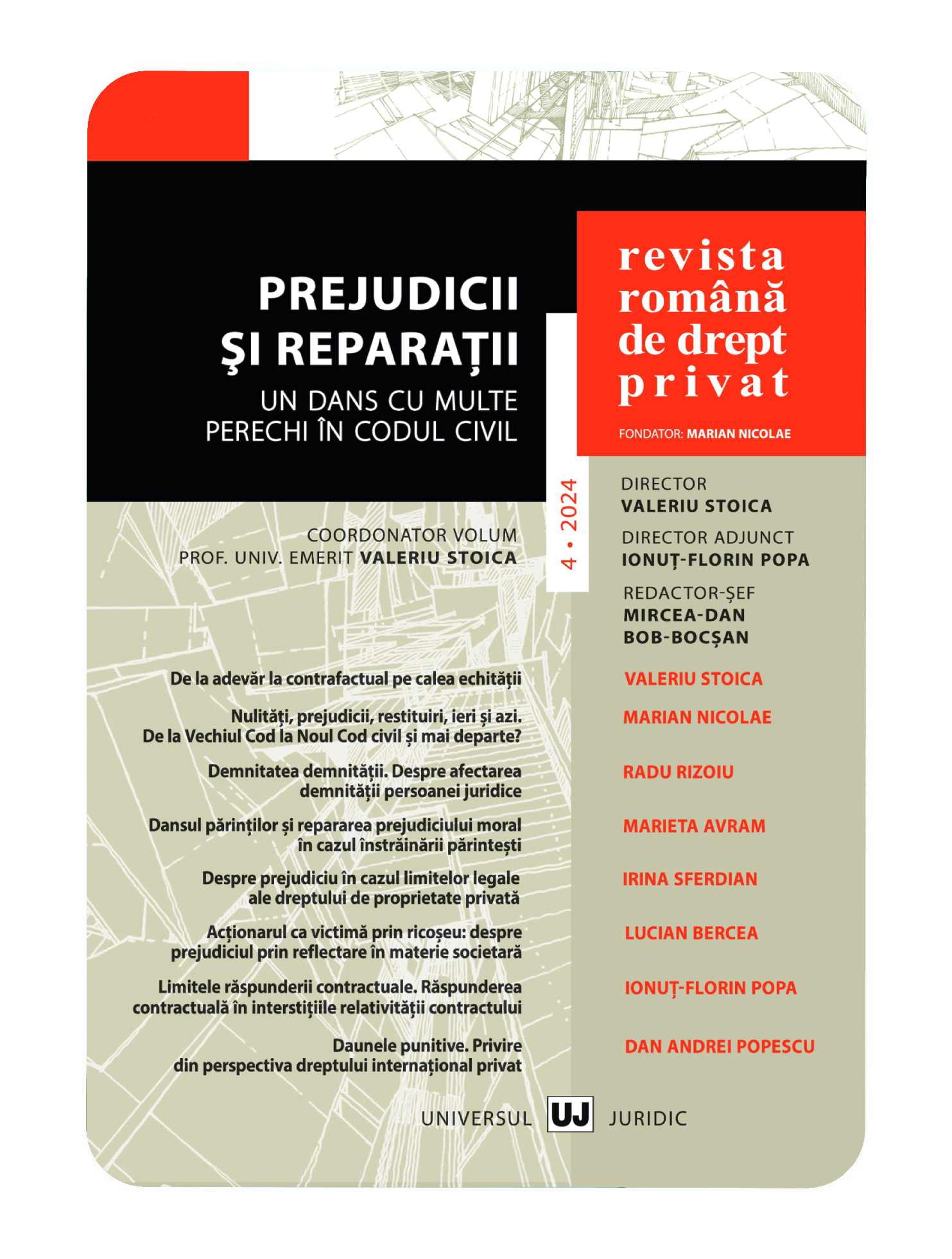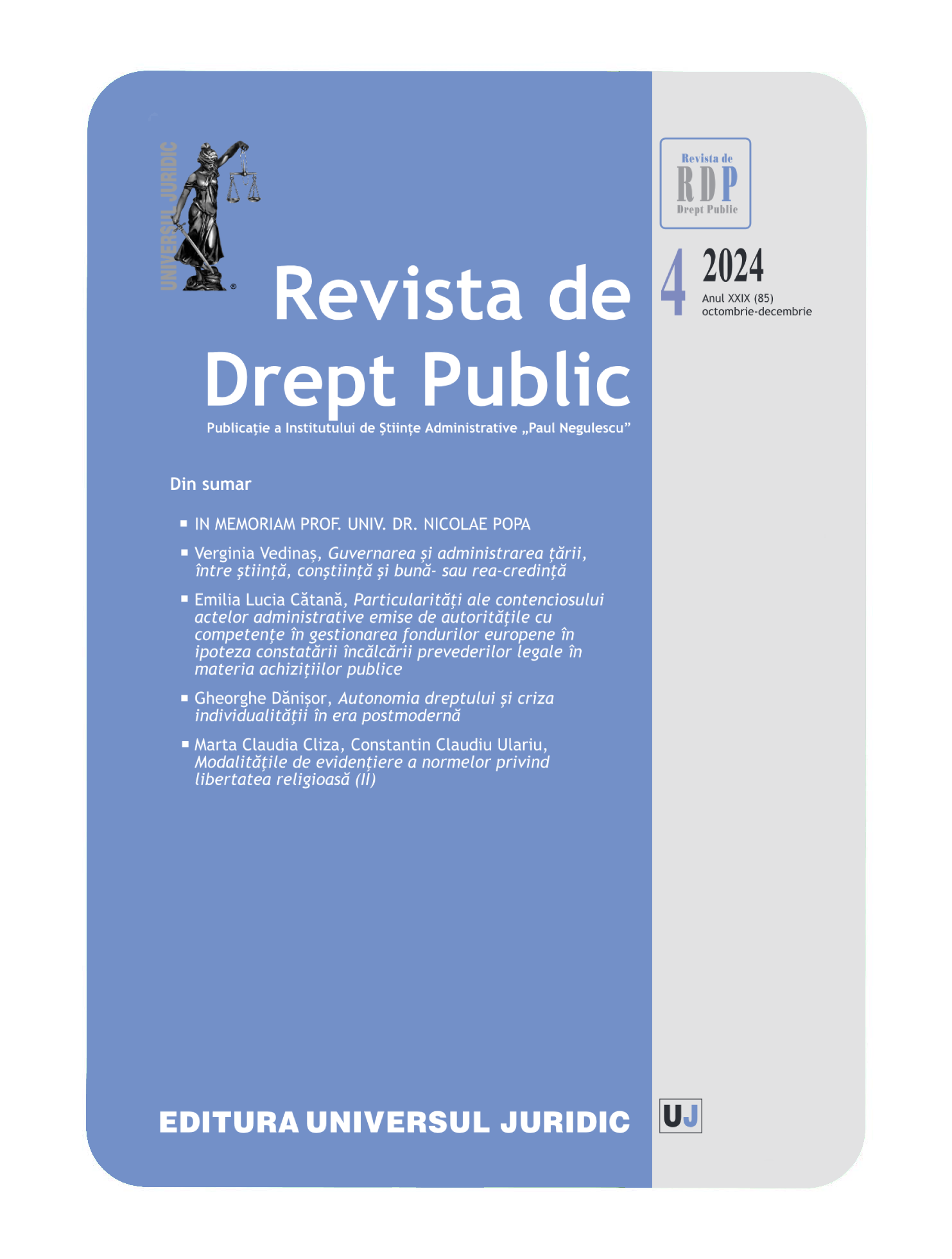Author(s): Dan Andrei Popescu / Language(s): Romanian
Issue: 04/2024
The present study promotes an analysis of the institution of punitive damages, seen especially from the perspective of private international law, more precisely the recognition of foreign court decisions that grant such sanctions.Punitive damages invite this challenge, to walk the tightrope that connects the two ends, the two legal systems: the one to which they traditionally belong and the one that is forced to analyze their effects and, as far as possible, reconcile them with local tradition. To reconcile the expectations of the damaged person with the expectation of the one who hopes to escape from them. The judge must find a way out. And it is not simple at all. He is held, on the one hand, by the anchors of his own legal system, but also by the obligation not to make changes to the substance of the foreign judgment that he is requested to recognize, and, on the other hand, by the imperative of justice, which for the victim means the full recognition of this decision, while for the one who fell into the claims it means, in the most unfortunate case, the reduction of compensation to those of an exclusively compensatory nature. Quo vadis?First, we consider that the institution of punitive damages does not per se contravenes our public order of private international law, not affecting any of the sacred principles that enshrine the backbone of our legal system.The key issue, however, is the one related to the dosage, to the extent to which the Romanian exequatur court will be able to “kidnap” part of the device of the foreign judgment, without distorting or disrupting the reasoning and thinking of the foreign judge. To what extent will it be able to reduce the extent of the punitive damages awarded to the victim by the foreign judgment? And, above all, if it will, to what extent is this reconciled with the rule of impossibility of reviewing the merits of the decision? Should we answer the question what is the review of the merits of a decision? It certainly means, in a way, “rejudging the cause”: of the existence of the deed, of the exclusive guilt of the one who caused it, rethinking the sanction applied. And here we come to compensatory and punitive damages. If with regard to the premiums – as with regard to the other aspects – those stipulated in the foreign country remain untouched, on the other hand, regarding the punitive damages, more precisely the justification of their extent, things can be discussed. In our opinion, the proportionality check carried out by the Romanian exequatur court, having as a benchmark our public order of private international law, does not have the significance of a genuine interference in the foreign judgment that has remained res judicata. Rather, it “brushes off” this determination, making it fit to integrate into our world. Especially since the preferred reason for punitive (exemplary) damages is not to “cover”, but to “dissuade”. Prevention is closely related to the public interest. And this interest cannot be thought and judged in abstracto, but only in the concrete of the relationship and where the effects are to be produced.Therefore, we consider that this “brushing” of the foreign judgment does not affect its content. In other words, the Romanian court is only faced with two options: to not recognize and not approve the execution of the foreign judgment that obliges punitive damages, invoking our public order of private international law, or, on the contrary, to anchor a wiser attitude, either recognizing, as the case may be, the foreign judgment in its entirety, or cutting from it what seems entirely excessive in terms of punitive damages, especially when the legal report in question has very close proximity ties to our country. We would be in the presence of a weakened public order, thought through the prism of proximity benchmarks. The principle of not reviewing the substance of the foreign judgment – the prohibition of reviewing the judgment “as to its substance” – is enshrined in Article 52 of Regulation (EU) No. 1215/2012 (Brussels I bis) on judicial jurisdiction, recognition and enforcement of judgments in civil and commercial matters (reform). However, the systematic interpretation of the text of Article 52 of the mentioned regulation can lead to the conclusion that the text allows, exceptionally, the review of the substance of the foreign judgment, but, as it was shown, “only to the extent that other provisions explicitly allow such a review”. In other words, although the wording of Article 52 seems extremely categorical (“In no case...”), it should be read in the sense that a judgment rendered in a member state can be reviewed, as regards the substance or procedure, in another member state, but only to the extent to which other rules of the regulation allow this. However, precisely such an exception is targeted by the invocation of public order under private international law, pursuant to Article 45 para. (1) lit. a), i.e. when “the recognition is clearly contrary to the public order (ordre public) of the requested member state – the case of punitive damages awarded by the foreign judgment”. Thus, depending on the intensity of proximity ties with our country, we consider that the Romanian court of exequatur has the freedom to appreciate the limits within which it can accept the production of the effects of punitive sanctions in Romania. On the other hand, we must take into account the fact that Article 52 of the Brussels I bis Regulation only considers “judgment rendered in a member state”. Only it cannot be the subject of a substantive review. Decisions from third countries (non-EU) can be challenged much more easily, especially from the perspective of public order.
More...


